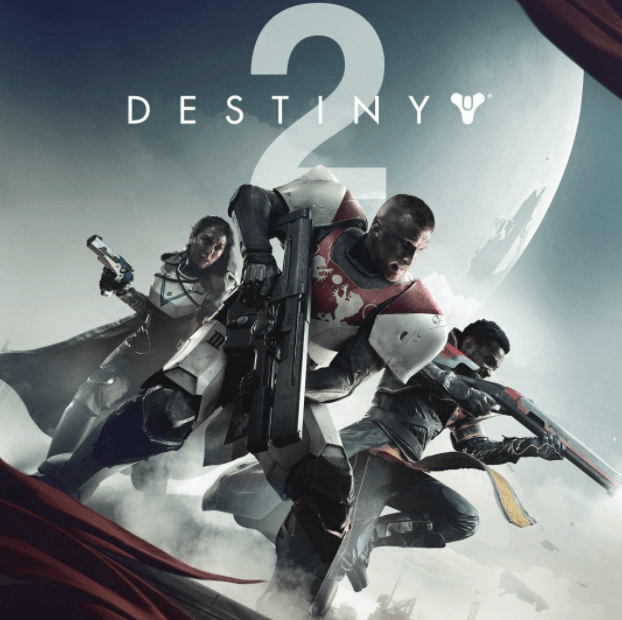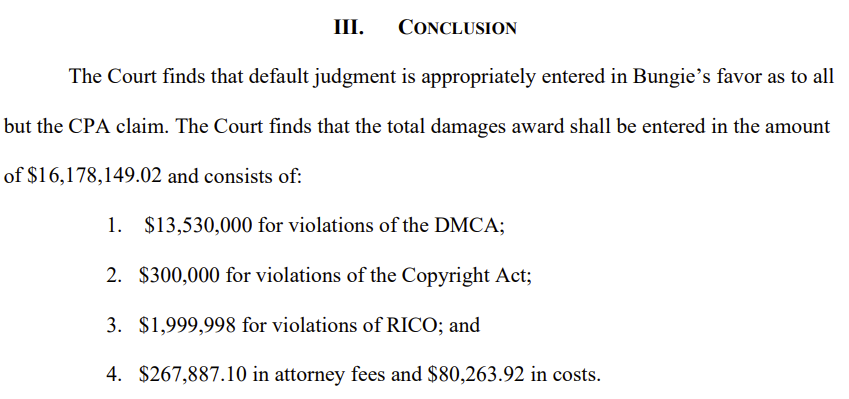 Bungie’s relentless pursuit of cheat developers, sellers, and resellers was probably crafted to send a deterrent message.
Bungie’s relentless pursuit of cheat developers, sellers, and resellers was probably crafted to send a deterrent message.
After another judgment and multi-million dollar damages award was handed down this week, any cheat developers still operating may consider other companies’ games less of a risk. For those still unconvinced, a judgment handed down Tuesday may be persuasive.
The Domino Effect
Bungie filed a copyright infringement lawsuit against defendants allegedly involved in the development and supply of Destiny 2 cheat ‘Wallhax’ back in August 2021.
In June 2022, Bungie was awarded $13.5m in copyright infringement damages against Elite Boss Tech, Inc., 11020781 Canada Inc., and owner Robert James Duthie Nelson. The defendants admitted that Wallhax injected new code into Bungie’s code, thereby creating an unlicensed derivative work. They also conceded that Wallhax circumvented Bungie’s technological measures in breach of the DMCA.
With an apparently compliant defendant at its disposal, Bungie was able to identify two other key defendants. One of them decided to help Bungie, but the other – Denmark-based developer Daniel Larsen – proved less cooperative.
Bungie’s response included calling in technical experts to paint Larsen’s contribution to Wallhax in an extremely negative light, and him personally as an uncooperative witness. Some may have been tempted to visit the United States to iron things out but according to court documents, Larsen resisted the temptation.
No Defendant Present, No Defense
On Monday, with Larsen thousands of miles away, Bungie filed a motion for default judgment at a Washington court and didn’t hold back. From a technical perspective, the motion wasn’t entirely successful, but that certainly didn’t prevent it from being a success.
Bungie asserted a total of eight claims against Larsen: copyright infringement, violations of the civil Racketeer Influenced and Corrupt Organizations Act (RICO), violations of the DMCA, violations of the Computer Fraud and Abuse Act (CFAA), violations of the Washington Consumer Protection Act (CPA), and civil conspiracy.
Seeking entry of default judgment on all claims, Bungie requested over $17.27m in damages, including almost $268k in attorney fees and $80,200 in costs. The company also requested a permanent injunction against Larsen, barring him from similar future conduct.
Successful Copyright Claims
District Judge Tana Lin found in favor of Bungie on its copyright infringement claim. Larsen’s conduct was indeed willful, an important factor in support of Bungie’s claim for enhanced damages.
Regarding Bungie’s RICO claim, the court found sufficient evidence to show that Larsen willfully utilized Bungie’s Destiny 2 software to develop the Wallhax cheat and that Larsen directly infringed Bungie’s copyrights for his own personal gain.
Since Larsen benefited financially from criminal copyright infringement through the sale of 6,000 cheats, with illegal gains also reinvested back into the business, the court was satisfied with Bungie’s RICO claim.
Bungie’s claim alleging violations of the DMCA’s anti-circumvention provision was equally successful.
“Bungie has provided allegations and evidence that Larsen developed and designed the Wallhax cheat to circumvent Bungie’s technological measures to protect its copyrighted works in violation of § 1201(a),” the order reads.
“And Bungie has shown that the Wallhax cheat circumvented the controls and that Larson himself evaded those controls by opening new accounts after being banned. Additionally, Bungie has shown that Larsen violated § 1201(b)(1) by creating an infringing derivative work. The Court finds that entry of default judgment on these claims is proper.”
Computer Fraud, Civil Conspiracy
The court also found that when Larsen intentionally accessed Destiny 2 servers to obtain the Destiny 2 software to create the Wallhax cheat, that amounted to a violation of the Computer Fraud and Abuse Act (CFAA).
When Larsen created multiple accounts after being banned from Destiny 2, he breached the terms of Bungie’s Limited Software License Agreement LSLA, the court found. No evidence supported Bungie’s claim that Larsen breached the Consumer Protection Act but the videogame company’s Civil Conspiracy claim succeeded, with the court noting that Bungie’s evidence was sufficient to show that Larsen conspired with the other defendants.
Default Judgment and Amount
Bungie asked the court for a damages award of $13,530,000 for violations of the DMCA. The court has the discretion to award no less than $200 or no more than $2,500 per act of circumvention, device or performance of service. Bungie requested $2,000 for each cheat downloaded and the court found the amount appropriate. Damages award granted: $13,530,000.
For its claim under the Copyright Act, Bungie asked the court for $466,718.90 in actual and statutory damages and requested the amount to be trebled due to Larsen’s willful conduct. The court said that Bungie failed to provide admissible evidence of actual damages but its claim for willful infringement of two copyrighted works was accepted. Damages award granted: $300,000.
In respect of Larsen’s alleged breach of contract, RICO and CFAA violations, the court awarded damages of $1,999,998. Bungie’s request for an award of $267,887.10 in attorney fees and $80,263.92 in costs was accepted by the court.
In total, the court awarded Bungie $16,178,149.02 in damages and costs, plus a broad injunction to restrain Larsen from any and all future activities similar to those dealt with in this case.
Whether Bungie will be able to collect anything from Larsen is unknown, but the above seems to provide an aggressive framework for dealing with any developers who target Bungie’s games in future.

The order granting default judgment and the judgment itself can be found here (1,2, pdf)





